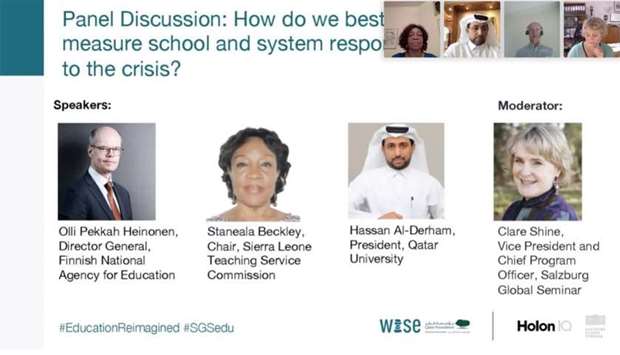Public health and public education are the major foundations of the society, observed an official of Unesco on the opening day of an international online conference organised by World Innovation Summit for Education (WISE) in collaboration with Salzburg Global Seminar and HolonIQ .
“The global pandemic of Covid-19 will not be defeated by health measures alone. Public health and public education are interconnected; they are two main pillars for a better society. We cannot allow them to be set in opposition,” observed, Stefania Giannini, assistant director-general for education, Unesco while delivering the keynote address at the Education Disrupted, Education Reimagined series Part II on Tuesday.
The three-day virtual gathering by WISE, a think tank of Qatar Foundation, addresses the impact of Covid-19 and the future of education systems around the world.
“The crisis has revealed the importance of digital connectivity and online platforms. Governments are already planning for the future along the lines of hybrid learning solutions and models that can combine traditional face-to-face learning and teaching with new technologies. These require not only the appropriate infrastructure, but access to digitalised curricula, digitalised training, and measure to protect privacies. This is why education needs more resources, not less than before,” explained, Giannini.
The UN official noted that the present times are a real game changer and the global society has the right opportunity to decide what kind of education will strengthen global inclusion, resilience, and peace.
The crisis caused by the pandemic, she said, has exposed the consequences “of digital inequality that deprived millions from learning, of gender inequality that exposed girls – more than boys – to violence, of social inequalities that left the poorest behind, and geographical inequity.”
According to Unesco, approximately 500mn children and learners do not have access to education, partly due to lack of connectivity. According to a recent survey, 60% of teachers in 60 countries lack the digital skills to facilitate online platform learning.
“The centre of an educational process is the human relationship, between a student and a teacher. The education systems best prepared to respond to crises will be those that are capable of valuing their teachers, granting them more freedom and autonomy, and giving them the conditions to work collaboratively. Education can save the future, and empower every child for a more resilient, inclusive, and sustainable world,” she highlighted.
At a panel discussion, Eddie Dutton, emergency manager for education at Education Cannot Wait, stressed the importance of teachers. In a session titled ‘The Impact of Covid-19 on Education Systems Now and in the Future’, he said: “Teachers can’t be replaced.”
“They play an important role in not just delivering education, but also in understanding the learning needs and psychosocial needs of children, and whether there’s something at home or in the community environment that may be preventing children from engaging in learning.”
Hassan al-Derham, president, Qatar University, highlighted how moving education systems forward will require the involvement of many different stakeholders.
“Communication is vital during this uncertainty,” he said. “It is very important to keep faculty, staff, students, and parents connected, as long as it is clear and transparent. We also have to be realistic and show why we are taking this direction. Leaders cannot do it alone and without the engagement of faculty, teachers, parents.”
Staneala Beckley, chair Sierra Leone, Teaching Service Commission also participated in the discussion that was moderated by Clare Shine, vice president and chief programme officer Salzburg Global Seminar.


